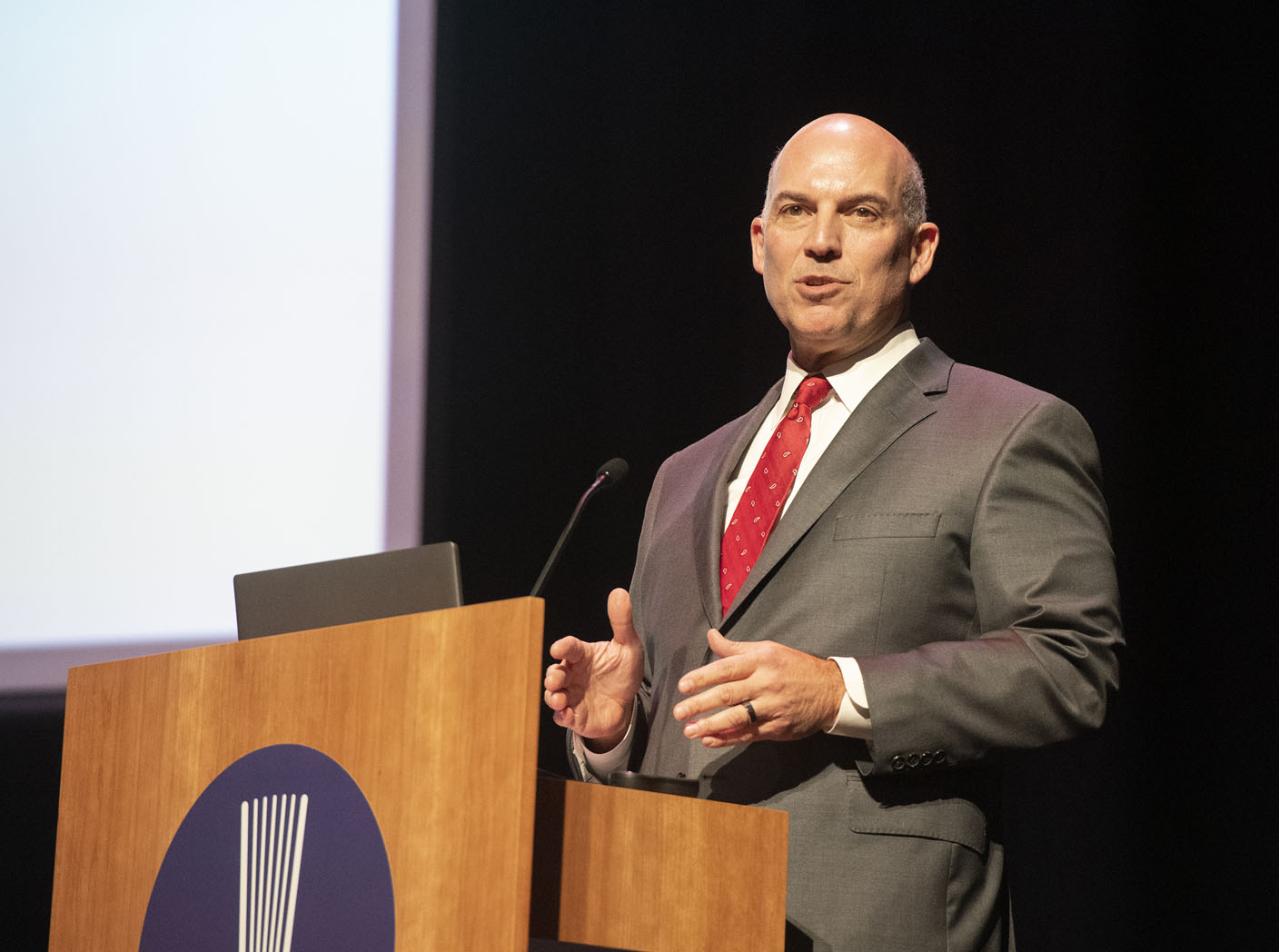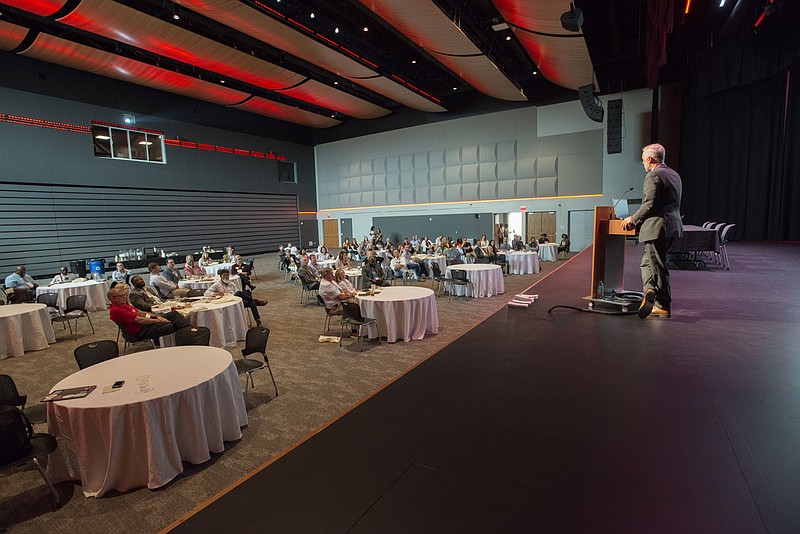FAYETTEVILLE -- Academic and community collaborators are sharing economic development ideas at this week's inaugural SEED Summit, which focuses on supporting entrepreneurial spirit.
"I'm so excited to talk entrepreneurship -- it's my favorite thing -- and I'm blown away by the interest in this topic," said Tiffany Henry, SEED Summit catalyst and an instructional designer in the Office of Entrepreneurship and Innovation at the University of Arkansas, Fayetteville.
More than 20 colleges and universities have representatives at SEED, "every region in the state is in this room" -- as well as some areas of Missouri and Oklahoma -- and "I hope you leave with new connections and ideas, and [first] steps for growing entrepreneurial ecosystems."
"Entrepreneurship is a team sport that takes people with a wide variety of experiences and skills working together to succeed," said Sarah Goforth, executive director of the Office of Entrepreneurship and Innovation. "When we pool our resources, that levels everyone up, and that's essential for entrepreneurial development in the state."
SEED stands for Start-up/Education/Economic Development.
Attendees can "take the tools and capabilities we have in this area to other communities in the state and hopefully replicate them," said Phil Shellhammer, senior director of Business Incubation in the Office of Entrepreneurship and Innovation. "There are things we can do right now that would help people in this state."
Mike Malone, UA-Fayetteville's vice chancellor for economic development, said he "can't wait to see what happens when you put [these] business, community, and academic leaders and practitioners together.
"I know great things are going to come from this."
Hosted by the Office of Entrepreneurship and Innovation in partnership with the university's Sam M. Walton College of Business, the SEED Summit aims to advance entrepreneurial ecosystem building across the state by fostering partnerships between the academic arena and the larger community, according to the university.
Attendees are learning about entrepreneurial program design tools that develop student startups and hearing from both student entrepreneurs and community founders through sessions focused on topics like why entrepreneurship is a critical piece of higher education, how the entrepreneurial mindset leads to innovative problem-solving, engaging local businesses to bridge the divide between universities and the cities they're part of, the community's role in creating an entrepreneurial ecosystem, and funding strategies to foster entrepreneurship.
During the summit, "we'll learn as much as we'll share, and the needs are always changing" regarding economic and entrepreneurial development, Goforth said. "We've come a long way in Arkansas, but we still have a ways to go, and we have major gaps," particularly in areas of the state without a major university.
Those areas "have a hard time putting together resources, and that's a gap we're trying to fill," both through remote connections, as well as empowering local leaders so that "you don't necessarily need a major university to do this [entrepreneurial] work," Goforth said. "We get up every morning trying to help the entire state, because that's part of our land-grant mission."
The Fayetteville Public Library hosts SEED, and the summit opened Tuesday with a keynote address by Maria Meyers on "how to build your entrepreneurial infrastructure."
Entrepreneurial ecosystems ought to be mapped, like a city's subway system, so entrepreneurs at various stages of development can locate the help they need, said Meyers, co-author of "Beyond Collisions: How to Build Your Entrepreneurial Infrastructure" and head of the University of Missouri-Kansas City Innovation Center. "Build a network, [rather than] a directory, [and] connect the lanes."
"Entrepreneurship is a contact sport -- a business is only as good as its network, especially at the start -- [so] we have got to cross the networks," said Meyers, founder of SourceLink, a network helping communities across the country build vibrant entrepreneurial ecosystems. Too often entrepreneurs are unaware of resources they could use for assistance, but "building an entrepreneurship ecosystem helps fix these problems."
"Every region has resources," but it's imperative for communities to understand those assets, as well as identifying "gaps," said Meyers, executive director of KCSourceLink, which connects a network of more than 250 business-development resources in the Kansas City region. "Collect data to see where" those weaknesses are, then measure growth and impact.
In 2021, first-time employers created nearly 20,000 jobs in the Kansas City region, and 63% of all net new jobs in that region are coming from first-time employers, she said. "Entrepreneurship is really important, [as] our start-ups are creating the new jobs in our communities, but it doesn't happen overnight."
"We can use entrepreneurship to build communities, [and it] starts with small steps," she said. Communities need to "provide every resource to help them be successful, but there are way more entrepreneurs out there than we have support for, now, so you have to" be additive.
Fortunately, entrepreneurship is "finally becoming a mainstream field of study, [and] everybody is teaching entrepreneurship, now," she said. "Entrepreneurship is all over universities," and particularly in small communities, colleges and universities are "really taking the lead" in entrepreneurial development.
In the Office of Entrepreneurship and Innovation, "we help students of all disciplines create something they are passionate about," Henry said. In 2021, "we engaged students from 47 different majors," and nearly 1,100 students attended trainings and/or workshops.
Universities impact the economy in several ways, from preparing the workforce of today and tomorrow with skills they need, to supporting small businesses and start-ups, to creating places and events where people mix and learn from one another [like the SEED Summit], Malone said. Ideas sparked at SEED will be "put to work in your communities, and the state's economy will be the true [beneficiary] of what happens here."
 Matthew A. Waller, Dean of the Sam M. Walton College of Business at the University of Arkansas, welcomes participants Tuesday during the inaugural Seed Summit at the Fayetteville Public Library. The event was hosted by the University of Arkansas Office of Entrepreneurship and Innovation in partnership with the Sam M. Walton College of Business Visit nwaonline.com/221012Daily/ for today's photo gallery. (NWA Democrat-Gazette/J.T. Wampler)
Matthew A. Waller, Dean of the Sam M. Walton College of Business at the University of Arkansas, welcomes participants Tuesday during the inaugural Seed Summit at the Fayetteville Public Library. The event was hosted by the University of Arkansas Office of Entrepreneurship and Innovation in partnership with the Sam M. Walton College of Business Visit nwaonline.com/221012Daily/ for today's photo gallery. (NWA Democrat-Gazette/J.T. Wampler)
